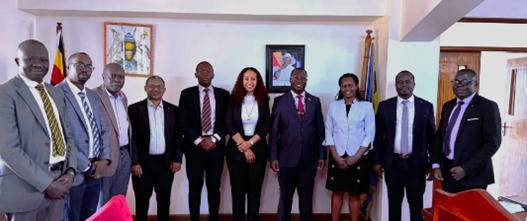Strengthening Labour Market Information System in Uganda and Kenya
Posted at June 20th 2025 12:00 AM | Updated as of June 20th 2025 12:00 AM
Region/Country : Uganda, Kenya
|Thèmes : Fair recruitment, Labour migration
A joint monitoring mission in Uganda and Kenya to assess ongoing initiatives supporting labour migration governance, reintegration of returned migrants, and the advancement of pre-departure training infrastructure.
From 9 to 15 February 2025, the International Labour Organization (ILO), through the Better Regional Migration Management (BRMM) Programme, funded by the UK Foreign, Commonwealth and Development Office (FCDO), conducted a joint monitoring mission in Uganda and Kenya to assess ongoing initiatives supporting labour migration governance, reintegration of returned migrants, and the advancement of pre-departure training infrastructure.
In Uganda, the BRMM programme continued its technical and financial support to the Ministry of Gender, Labour, and Social Development (MGLSD) and the Uganda Bureau of Statistics (UBOS) to strengthen the country’s Labour Market Information System (LMIS). During the mission, the team met with H.E. Aggrey David Kibenge, Permanent Secretary of the Ministry of Gender, Labour, and Social Development (MGLSD), and reviewed the preparatory steps for the upcoming launch of Uganda’s LMIS on 1 May 2025. Discussions focused on data compilation, system testing, metadata alignment, and final preparations for full implementation. The mission also addressed broader issues related to labour migration management, including reintegration services for returned migrants in Kampala Metropolitan City.
At UBOS, the mission reviewed the technical progress made under BRMM support. This included the development of a national LMIS master plan, capacity building for staff on ILO SDMX tools, and the integration of labour migration data into the Labour Force Survey (LFS). UBOS confirmed plans to incorporate migration modules into upcoming surveys and outlined how the National Standard Indicator Framework (NSI) is supporting administrative data improvements. The LMIS, once operational, is expected to offer stakeholders a reliable data-driven foundation to design policies addressing both systemic and localized migration challenges.
In parallel, the mission assessed reintegration efforts led by Wezesha Impact. The BRMM-supported initiative in the Greater Kampala Metropolitan Area has reached 420 returned migrants, of whom 261 have successfully launched income-generating businesses. During a half-day meeting with the Wezesha team, ILO representatives met SIYB trainers and beneficiaries engaged in financial education sessions. Discussions focused on training quality, business development service delivery, implementation bottlenecks, and agreed next steps. The programme’s success was evident not only in the number of enterprises started but also in the targeted mentorship and cash transfer components supporting their sustainability.
In Kenya, the monitoring mission engaged with key BRMM implementing partners, including the Federation of Kenya Employers (FKE) and Destiny Path Foundation. Through these partnerships, 1,071 returned migrants 69% of them women were reached across Mombasa and Nairobi with a comprehensive reintegration package that included Start and Improve Your Business (SIYB) training, financial literacy, business development services, cash transfers, and access to tailored loan products. Of those reached, 541 returnees have successfully established their own businesses, contributing to both household income and local employment.
The mission also visited the recently completed Arabian Model House constructed with BRMM support and launched by the National Industrial Training Authority (NITA) on 28 February 2025. The model house is a training facility designed to simulate working conditions for outbound domestic workers heading to Gulf countries. It plays a vital role in enhancing the quality and relevance of pre-departure training by preparing workers for the cultural and practical realities they will encounter abroad. This infrastructure will further professionalize Kenya’s labour migration process and ensure that workers leave better informed and equipped.


